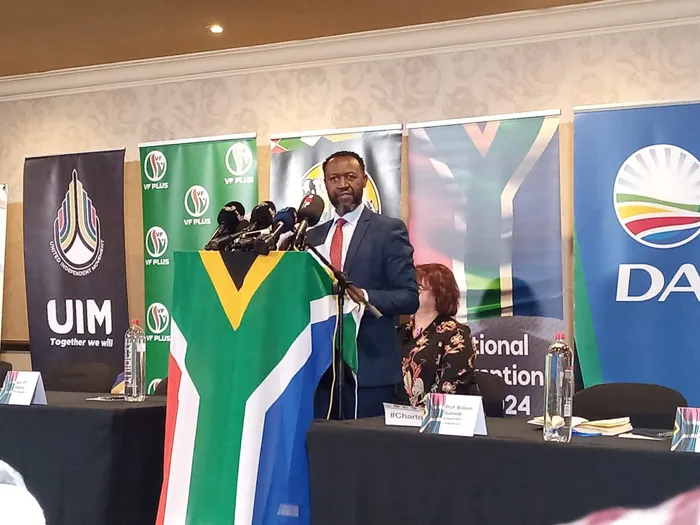‘South Africans are not prisoners of history, it's about time they must dream about the possibility of a new government’

The Multi-Party Charter of South Africa's independent convention chairperson Professor William Gumede updated the media on the final day of the convention at Emperors Palace in Johannesburg on Thursday. Picture: Kailene Pillay/IOL
The recently formed Multi-Party Charter (MPC), which is better known as the Moonshot Pack, has been hailed by analysts as a step in the right direction to galvanise support against the African National Congress (ANC), which has been in power for 30 years.
The MPC was recently formed by leaders of seven political parties, such as the Democratic Alliance, ActionSA, Inkatha Freedom Party, Freedom Front Plus, United Independent Movement, Spectrum National Party, and the Independent South African National Civic Organisation.
These parties met at the National Convention in Kempton Park, Gauteng, in a two-day meeting to create a coalition which they believe could unseat the governing party in the upcoming general elections.
DA Leader John Steenhuisen said they have collectively agreed on a shared vision, principles for a new government, and a minimum programme of action to address the urgent problems that present an existential risk to the country’s future.
‘’The seven political parties in this Charter have come together to unseat the ANC, keep the EFF out of power, and provide a new alternative government to rescue South Africa in 2024,’’ said Steenhuisen.
Political analyst Professor Sipho Seepe said the MPC must be viewed as an attempt to create a narrative that suggests that the ANC can be defeated. He said South Africans must start imagining a life without the ANC.
‘’The MPC will prepare South Africa sociologically to realise that there’s life beyond the ANC. It will also attract those who have given up on voting because they believe that the ANC will win every general election. The MPC will give them hope to vote again,’’ said Seepe.
‘’The ANC has also lost confidence in itself as it continues to talk about coalitions in metros and so on. South Africans are not prisoners of history, and it's about that time they must dream about the possibility of a new government,’’ said Seepe.
He said regardless of the different policies and ideologies these seven political parties might have, the most important part is service delivery, and whether these parties can put the interests of the people first, it's possible that they might win their support.
‘’People don’t care about ideologies. All they want is service delivery; they want functioning schools, job opportunities, and roads to be fixed and as Nelson Mandela once said, ‘It doesn't matter if a cat is black or white, as long as it catches mice’.”
David Ansara, CEO of the Free Market Foundation (FMF), said the MPC is based on opportunity and freedom and that its policies will reflect the demographic of this country.
“Among the Multi-Party Charter for South Africa’s ‘Shared Governing Principles’ are included, ‘decentralising power to the lowest effective level of government’, a commitment to 'redress our unjust past by promoting non racialism and unity in our diversity’, and 'an open market economy’. In the FMF’s view, an open market economy means greater levels of choice for ordinary South Africans, much more competitiveness and market-based solutions, including deregulation of the economy and privatisation of state functions and enterprises,” said Ansara.
He said he specially welcomed the fact that the Multi-Party Charter has explicitly outlined freedom as one of its values.
“Freedom is often downplayed in the political discourse in South Africa, yet it is essential for the formation of a prosperous and peaceful society.”